News
Completed project: Pacosil - Coupled energetic and material utilisation of spelt and oat husks
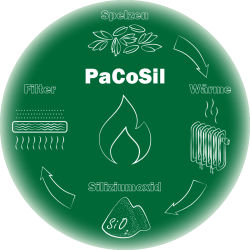
At the beginning of this year (2025), the project ‘Pacosil - Combustion of regionally available residues for the energetic utilisation of biomass and the coupled production of biogenic silica for fine dust filter processes’ was completed. In the joint project, a process for the combined energy and material utilisation of spelt and oat husks was developed in collaboration with A.P. Bioenergietechnik GmbH and ETE EmTechEngineering GmbH. As an application example, the silicon-rich ashes produced from spelt and oat husks have been successfully used as a precoat material in exhaust gas and ambient air filtration. Further fields of application can be considered in the future. If you are interested in this topic, please contact Thomas Schliermann [E-Mail].
16th Precipitator-Symposium in Straubing
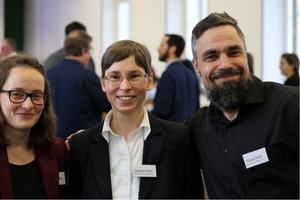
The 16th edition of the Separator Expert Discussion took place on 11/12 February 2025 at the Technology and Support Centre (TFZ) in Straubing. This event, organised by the TFZ and DBFZ, has been discussing current research findings as well as the market situation in the field of precipitators and catalysts for wood combustion systems for 16 years now. The particulate matter produced during combustion and the associated health effects are viewed critically in the case of wood combustion systems. In the course of the currently discussed tightening of European regulations such as the Ecodesign Directive, a further development of the technologies currently used on the market could become necessary. Integrated and downstream emission reduction technologies such as precipitators and catalysts can make a contribution to this. Mirjam Müller presented current research results on the ‘Effect of electrostatic precipitators at biomass combustion systems on particle number and particle size distribution’ at the event. You can find the conference reader of the event here.
Podcast on the subject of clean wood firing systems
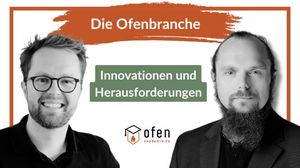
Ingo Hartmann was a guest on the ‘Freude am Feuern’ podcast on 12th September 2024. In an interview with Max Kummrow, founder and managing director of the Ofenakademie, Ingo Hartmann spoke about the scientific view of the stove of the future and how research envisions a clean stove. The episode is available free of charge on Spotify under the following [Link].
Completed project: BioFeuSe - Sensor technology for process optimisation of SCR processes and particle precipitation in biomass combustion systems
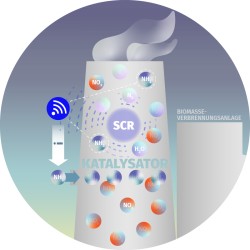
As part of a regenerative energy supply, biogenic residual and waste materials must be increasingly utilised for energy purposes in the future. The resulting pollutant emissions must be monitored using suitable measuring systems and, if necessary, be reduced by appropriate exhaust gas purification systems. Due to the relatively high nitrogen content, the conversion of biogenic residues results in increased NOX emissions, which can be reduced by suitable processes such as selective catalytic reduction (SCR). Suitable sensors are required for monitoring and controlling SCR systems in order to realise automatic dosing of optimal amounts of reducing agent and to be able to monitor compliance with relevant limit values (NOX, NH3). The sensors and measurement technology currently available on the market are not selective enough or are simply too expensive for use in small decentralised biomass facilities. For this reason, in cooperation with the University of Bayreuth (Chair of Functional Materials), CPK Automotive GmbH & Co. KG and H+H Engineering & Service GmbH the development of innovative sensors for measuring NOX and NH3, which can be used economically for the control of SCR systems and the monitoring of residual material plants, was investigated. The project was completed in mid-2024 with promising initial results. If you are interested in the topic, please contact Mario König [E-Mail].
Science Prize Bronze of the Biogas-Innovationskongresses
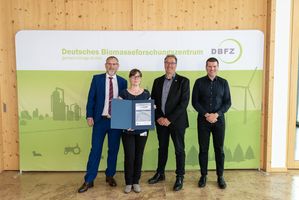
The Bronze Science Award of the Biogas-Innovationskongresses went to our colleague Bettina Stolze in May 2024. Our warmest congratulations! The topic she presented was entitled ‘From residue to a catalyst for methane oxidation’ and deals with oxidation catalysts for the reduction of methane in the exhaust gas of biogas CHPs. Oxidation catalysts for carbon monoxide and formaldehyde, among others, are state of the art and widely used. The basis or technical prerequisites for retrofitting an active oxidation catalytic converter, which is also capable of oxidising methane, are therefore already available on many CHP units. However, no catalyst that can reliably oxidise methane under these conditions is yet available on the market. The MeKat research project (FKZ no. 03EI5456) is developing a catalyst based on biogenic silica that minimises methane slip in the exhaust gas from biogas CHP units. The aim is to ensure compliance with existing and future limit values for methane emissions and to reduce overall methane emissions despite the expansion of renewable energies. Bettina Stolze will be happy to answer any questions about the project you may have [E-Mail].
Doctoral degree with special honours

Clement Owusu Prempeh was awarded 3rd place in the lecture category of the DGAW Science Award CEC4Europe at the 13. Wissenschaftskongress „Abfall- und Ressourcenwirtschaft“ (DGAW Wiko) on 15-16th February 2024 in Vienna. Congratulations to him! The subject of his presentation was ‘Generation of biogenic silica from biomass residues as a catalyst support for low-temperature catalytic methane combustion’, results out of his doctoral thesis.